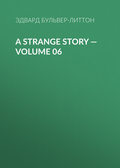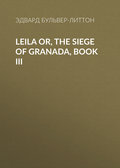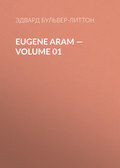
Эдвард Бульвер-Литтон
The Disowned — Complete
CHAPTER LXXXIV
A Hounsditch man, one of the devil's near kinsmen,—a broker.—Every Man in His Humour.
We have here discovered the most dangerous piece of lechery that ever was known in the commonwealth.—Much Ado about Nothing.
It was an evening of mingled rain and wind, the hour about nine, when Mr. Morris Brown, under the shelter of that admirable umbrella of sea-green silk, to which we have before had the honour to summon the attention of our readers, was, after a day of business, plodding homeward his weary way. The obscure streets through which his course was bent were at no time very thickly thronged, and at the present hour the inclemency of the night rendered them utterly deserted. It is true that now and then a solitary female, holding up, with one hand, garments already piteously bedraggled, and with the other thrusting her umbrella in the very teeth of the hostile winds, might be seen crossing the intersected streets, and vanishing amid the subterranean recesses of some kitchen area, or tramping onward amidst the mazes of the metropolitan labyrinth, till, like the cuckoo, “heard,” but no longer “seen,” the echo of her retreating pattens made a dying music to the reluctant ear; or indeed, at intervals of unfrequent occurrence, a hackney vehicle jolted, rumbling, bumping over the uneven stones, as if groaning forth its gratitude to the elements for which it was indebted for its fare. Sometimes also a chivalrous gallant of the feline species ventured its delicate paws upon the streaming pavement, and shook, with a small but dismal cry, the raindrops from the pyramidal roofs of its tender ears.
But, save these occasional infringements on its empire, solitude, dark, comfortless, and unrelieved, fell around the creaking footsteps of Mr. Morris Brown. “I wish,” soliloquized the worthy broker, “that I had been able advantageously to dispose of this cursed umbrella of the late Lady Waddilove; it is very little calculated for any but a single lady of slender shape, and though it certainly keeps the rain off my hat, it only sends it with a double dripping upon my shoulders. Pish, deuce take the umbrella! I shall catch my death of cold.”
These complaints of an affliction that was assuredly sufficient to irritate the naturally sweet temper of Mr. Brown, only ceased as that industrious personage paused at the corner of the street, for the purpose of selecting the driest path through which to effect the miserable act of crossing to the opposite side. Occupied in stretching his neck over the kennel, in order to take the fullest survey of its topography which the scanty and agitated lamps would allow, the unhappy wanderer, lowering his umbrella, suffered a cross and violent gust of wind to rush, as if on purpose, against the interior. The rapidity with which this was done, and the sudden impetus, which gave to the inflated silk the force of a balloon, happening to occur exactly at the moment Mr. Brown was stooping with such wistful anxiety over the pavement, that gentleman, to his inexpressible dismay, was absolutely lifted, as it were, from his present footing, and immersed in a running rivulet of liquid mire, which flowed immediately below the pavement. Nor was this all: for the wind, finding itself somewhat imprisoned in the narrow receptacle it had thus abruptly entered, made so strenuous an exertion to extricate itself, that it turned Lady Waddilove’s memorable relic utterly inside out; so that when Mr. Brown, aghast at the calamity of his immersion, lifted his eyes to heaven, with a devotion that had in it more of expostulation than submission, he beheld, by the melancholy lamps, the apparition of his umbrella,—the exact opposite to its legitimate conformation, and seeming, with its lengthy stick and inverted summit, the actual and absolute resemblance of a gigantic wineglass.
“Now,” said Mr. Brown, with that ironical bitterness so common to intense despair, “now, that’s what I call pleasant.”
As if the elements were guided and set on by all the departed souls of those whom Mr. Brown had at any time overreached in his profession, scarcely had the afflicted broker uttered this brief sentence, before a discharge of rain, tenfold more heavy than any which had yet fallen, tumbled down in literal torrents upon the defenceless head of the itinerant.
“This won’t do,” said Mr. Brown, plucking up courage and splashing out of the little rivulet once more into terra firma, “this won’t do: I must find a shelter somewhere. Dear, dear, how the wet runs down me! I am for all the world like the famous dripping well in Derbyshire. What a beast of an umbrella! I’ll never buy one again of an old lady: hang me if I do.”
As the miserable Morris uttered these sentences, which gushed out, one by one, in a broken stream of complaint, he looked round and round—before, behind, beside—for some temporary protection or retreat. In vain: the uncertainty of the light only allowed him to discover houses in which no portico extended its friendly shelter, and where even the doors seemed divested of the narrow ledge wherewith they are, in more civilized quarters, ordinarily crowned.
“I shall certainly have the rheumatism all this winter,” said Mr. Brown, hurrying onward as fast as he was able. Just then, glancing desperately down a narrow lane, which crossed his path, he perceived the scaffolding of a house in which repair or alteration had been at work. A ray of hope flashed across him; he redoubled his speed, and, entering the welcome haven, found himself entirely protected from the storm. The extent of the scaffolding was, indeed, rather considerable; and though the extreme narrowness of the lane and the increasing gloom of the night left Mr. Brown in almost total darkness, so that he could not perceive the exact peculiarities of his situation, yet he was perfectly satisfied with the shelter he had obtained; and after shaking the rain from his hat, squeezing his coat sleeves and lappets, satisfying himself that it was only about the shoulders that he was thoroughly wetted, and thrusting two pocket-handkerchiefs between his shirt and his skin, as preventives to the dreaded rheumatism, Mr. Brown leaned luxuriously back against the wall in the farthest corner of his retreat, and busied himself with endeavouring to restore his insulted umbrella to its original utility of shape.
Our wanderer had been about three minutes in this situation; when he heard the voices of two men, who were hastening along the lane.
“But do stop,” said one; and these were the first words distinctly audible to the ear of Mr. Brown, “do stop, the rain can’t last much longer, and we have a long way yet to go.”
“No, no,” said the other, in a voice more imperious than the first, which was evidently plebeian and somewhat foreign in its tone, “no, we have no time. What signify the inclemencies of weather to men feeding upon an inward and burning thought, and made, by the workings of the mind, almost callous to the contingencies of the frame?”
“Nay, my very good friend,” said the first speaker, with positive though not disrespectful earnestness, “that may be all very fine for you, who have a constitution like a horse; but I am quite a—what call you it—an invalid, eh? and have a devilish cough ever since I have been in this d—d country; beg your pardon, no offence to it; so I shall just step under cover of this scaffolding for a few minutes, and if you like the rain so much, my very good friend, why, there is plenty of room in the lane to—(ugh! ugh! ugh!) to enjoy it.”
As the speaker ended, the dim light, just faintly glimmering at the entrance of the friendly shelter, was obscured by his shadow, and presently afterwards his companion, joining him, said,—
“Well, if it must be so; but how can you be fit to brave all the perils of our scheme, when you shrink, like a palsied crone, from the sprinkling of a few water-drops?”
“A few water-drops, my very good friend,” answered the other, “a few—what call you them, ay, water-falls rather; (ugh! ugh!) but let me tell you, my brother citizen, that a man may not like to get his skin wet with waters and would yet thrust his arm up to the very elbow in blood! (ugh! ugh!)”
“The devil!” mentally ejaculated Mr. Brown, who at the word “scheme” had advanced one step from his retreat, but who now at the last words of the intruder drew back as gently as a snail into his shell; and although his person was far too much enveloped in shade to run the least chance of detection, yet the honest broker began to feel a little tremor vibrate along the chords of his thrilling frame, and a new anathema against the fatal umbrella rise to his lips.
“Ah!” quoth the second, “I trust that it may be so; but, to return to our project, are you quite sure that these two identical ministers are in the regular habit of walking homeward from that Parliament which their despotism has so degraded?”
“Sure? ay, that I am; Davidson swears to it!”
“And you are also sure of their persons, so that, even in the dusk, you can recognize them? for you know I have never seen them.”
“Sure as fivepence!” returned the first speaker, to whose mind the lives of the persons referred to were of considerably less value than the sum elegantly specified in his metaphorical reply.
“Then,” said the other, with a deep, stern determination of tone, “then shall this hand, by which one of the proudest of our oppressors has already fallen, be made a still worthier instrument of the wrath of Heaven!”
“You are a d—d pretty shot, I believe,” quoth the first speaker, as indifferently as if he were praising the address of a Norfolk squire.
“Never did my eye misguide me, or my aim swerve a hair’s-breadth from its target! I thought once, when I learned the art as a boy, that in battle, rather than in the execution of a single criminal, that skill would avail me.”
“Well, we shall have a glorious opportunity to-morrow night!” answered the first speaker; “that is, if it does not rain so infernally as it does this night; but we shall have a watch of many hours, I dare say.”
“That matters but little,” replied the other conspirator; “nor even if, night after night, the same vigil is renewed and baffled, so that it bring its reward at last.”
“Right,” quoth the first; “I long to be at it!—ugh! ugh! ugh!—what a confounded cough I have! it will be my death soon, I’m thinking.”
“If so,” said the other, with a solemnity which seemed ludicrously horrible, from the strange contrast of the words and object, “die at least with the sanctity of a brave and noble deed upon your conscience and your name!”
“Ugh! ugh!—I am but a man of colour, but I am a patriot, for all that, my good friend! See, the violence of the rain has ceased; we will proceed;” and with these words the worthy pair left the place to darkness and Mr. Brown.
“O Lord!” said the latter, stepping forth, and throwing, as it were, in that exclamation, a whole weight of suffocating emotion from his chest, “what bloody miscreants! Murder his Majesty’s ministers!—‘shoot them like pigeons!’—‘d—d pretty shot!’ indeed. O Lord! what would the late Lady Waddilove, who always hated even the Whigs so cordially, say, if she were alive? But how providential that I should have been here! Who knows but I may save the lives of the whole administration, and get a pension or a little place in the post-office? I’ll go to the prime minister directly,—this very minute! Pish! ar’n’t you right now, you cursed thing?” upbraiding the umbrella, which, half-right and half-wrong, seemed endued with an instinctive obstinacy for the sole purpose of tormenting its owner.
However, losing this petty affliction in the greatness of his present determination, Mr. Brown issued out of his lair, and hastened to put his benevolent and loyal intentions into effect.
CHAPTER LXXXV
When laurelled ruffians die, the Heaven and Earth,
And the deep Air give warning. Shall the good
Perish and not a sign?
—ANONYMOUS.
It was the evening after the event recorded in our last chapter: all was hushed and dark in the room where Mordaunt sat alone; the low and falling embers burned dull in the grate, and through the unclosed windows the high stars rode pale and wan in their career. The room, situated at the back of the house, looked over a small garden, where the sickly and hoar shrubs, overshadowed by a few wintry poplars and grim firs, saddened in the dense atmosphere of fog and smoke, which broods over our island city. An air of gloom hung comfortless and chilling over the whole scene externally and within. The room itself was large and old, and its far extremities, mantled as they were with dusk and shadow, impressed upon the mind that involuntary and vague sensation, not altogether unmixed with awe, which the eye, resting upon a view that it can but dimly and confusedly define, so frequently communicates to the heart. There was a strange oppression at Mordaunt’s breast with which he in vain endeavoured to contend. Ever and anon, an icy but passing chill, like the shivers of a fever, shot through his veins, and a wild and unearthly and objectless awe stirred through his hair, and his eyes filled with a glassy and cold dew, and sought, as by a self-impulse, the shadowy and unpenetrated places around, which momently grew darker and darker. Little addicted by his peculiar habits to an over-indulgence of the imagination, and still less accustomed to those absolute conquests of the physical frame over the mental, which seem the usual sources of that feeling we call presentiment, Mordaunt rose, and walking to and fro along the room, endeavoured by the exercise to restore to his veins their wonted and healthful circulation. It was past the hour in which his daughter retired to rest: but he was often accustomed to steal up to her chamber, and watch her in her young slumbers; and he felt this night a more than usual desire to perform that office of love; so he left the room and ascended the stairs. It was a large old house that he tenanted. The staircase was broad, and lighted from above by a glass dome; and as he slowly ascended, and the stars gleamed down still and ghastly upon his steps, he fancied—but he knew not why—that there was an omen in their gleam. He entered the young Isabel’s chamber: there was a light burning within; he stole to her bed, and putting aside the curtain, felt, as he looked upon her peaceful and pure beauty, a cheering warmth gather round his heart. How lovely is the sleep of childhood! What worlds of sweet, yet not utterly sweet, associations, does it not mingle with the envy of our gaze! What thoughts and hopes and cares and forebodings does it not excite! There lie in that yet ungrieved and unsullied heart what unnumbered sources of emotion! what deep fountains of passion and woe! Alas! whatever be its earlier triumphs, the victim must fall at last! As the hart which the jackals pursue, the moment its race is begun the human prey is foredoomed for destruction, not by the single sorrow, but the thousand cares: it may baffle one race of pursuers, but a new succeeds; as fast as some drop off exhausted, others spring up to renew and to perpetuate the chase; and the fated, though flying victim never escapes but in death. There was a faint smile upon his daughter’s lip, as Mordaunt bent down to kiss it; the dark lash rested on the snowy lid—ah, that tears had no well beneath its surface!—-and her breath stole from her rich lips with so regular and calm a motion that, like the “forest leaves,” it “seemed stirred with prayer!” [And yet the forest leaves seem stirred with prayer.—BYRON.] One arm lay over the coverlet, the other pillowed her head, in the unrivalled grace of infancy.
Mordaunt stooped once more, for his heart filled as he gazed upon his child, to kiss her cheek again, and to mingle a blessing with the kiss. When he rose, upon that fair smooth face there was one bright and glistening drop; and Isabel stirred in sleep, and, as if suddenly vexed by some painful dream, she sighed deeply as she stirred. It was the last time that the cheek of the young and predestined orphan was ever pressed by a father’s kiss or moistened by a father’s tear! He left the room silently; no sooner had he left it, than, as if without the precincts of some charmed and preserving circle, the chill and presentiment at his heart returned. There is a feeling which perhaps all have in a momentary hypochondria felt at times: it is a strong and shuddering impression which Coleridge has embodied in his own dark and supernatural verse, that something not of earth is behind us; that if we turned our gaze backward we should behold that which would make the heart as a bolt of ice, and the eye shrivel and parch within its socket. And so intense is the fancy that when we turn, and all is void, from that very void we could shape a spectre, as fearful as the image our terror had foredrawn. Somewhat such feeling had Mordaunt now, as his steps sounded hollow and echoless on the stairs, and the stars filled the air around him with their shadowy and solemn presence. Breaking by a violent effort from a spell of which he felt that a frame somewhat overtasked of late was the real enchanter, he turned once more into the room which he had left to visit Isabel. He had pledged his personal attendance at an important motion in the House of Commons for that night, and some political papers were left upon his table which he had promised to give to one of the members of his party. He entered the room, purposing to stay only a minute; an hour passed before he left it: and his servant afterwards observed that, on giving him some orders as he passed through the hall to the carriage, his cheek was as white as marble, and that his step, usually so haughty and firm, reeled and trembled like a fainting man’s. Dark and inexplicable Fate! weaver of wild contrasts, demon of this hoary and old world, that movest through it, as a spirit moveth over the waters, filling the depths of things with a solemn mystery and an everlasting change! Thou sweepest over our graves, and Joy is born from the ashes: thou sweepest over Joy, and lo, it is a grave! Engine and tool of the Almighty, whose years cannot fade, thou changest the earth as a garment, and as a vesture it is changed; thou makest it one vast sepulchre and womb united, swallowing and creating life! and reproducing, over and over, from age to age, from the birth of creation to the creation’s doom, the same dust and atoms which were our fathers, and which are the sole heirlooms that through countless generations they bequeath and perpetuate to their sons.
CHAPTER LXXXVI
Methinks, before the issue of our fate,
A spirit moves within us, and impels
The passion of a prophet to our lips.
—ANONYMOUS.O vitae Philosophia dux, virtutis indagatrix!-CICERO.
["O Philosophy, conductress of life, searcher after virtue!"]
Upon leaving the House of Commons, Mordaunt was accosted by Lord Ulswater, who had just taken his seat in the Upper House. Whatever abstraction or whatever weakness Mordaunt might have manifested before he had left his home, he had now entirely conquered both; and it was with his usual collected address that he replied to Lord Ulswater’s salutations, and congratulated him on his change of name and accession of honours.
It was a night of uncommon calm and beauty; and, although the moon was not visible, the frosty and clear sky, “clad in the lustre of its thousand stars,” [Marlowe] seemed scarcely to mourn either the hallowing light or the breathing poesy of her presence; and when Lord Ulswater proposed that Mordaunt should dismiss his carriage, and that they should walk home, Algernon consented not unwillingly to the proposal. He felt, indeed, an unwonted relief in companionship; and the still air and the deep heavens seemed to woo him from more unwelcome thoughts, as with a softening and a sister’s love.
“Let us, before we return home,” said Lord Ulswater, “stroll for a few moments towards the bridge: I love looking at the river on a night like this.”
Whoever inquires into human circumstances will be struck to find how invariably a latent current of fatality appears to pervade them. It is the turn of the atom in the scale which makes our safety or our peril, our glory or our shame, raises us to the throne or sinks us to the grave. A secret voice at Mordaunt’s heart prompted him to dissent from this proposal, trifling as it seemed and welcome as it was to his present and peculiar mood: he resisted the voice,—the moment passed away, and the last seal was set upon his doom; they moved onward towards the bridge. At first both were silent, for Lord Ulswater used the ordinary privilege of a lover and was absent and absorbed, and his companion was never the first to break a taciturnity natural to his habits. At last Lord Ulswater said, “I rejoice that you are now in the sphere of action most likely to display your talents: you have not spoken yet, I think; indeed, there has been no fitting opportunity, but you will soon, I trust.”
“I know not,” said Mordaunt, with a melancholy smile, “whether you judge rightly in thinking the sphere of political exertion the one most calculated for me; but I feel at my heart a foreboding that my planet is not fated to shine in any earthly sphere. Sorrow and misfortune have dimmed it in its birth, and now it is waning towards its decline.”
“Its decline!” repeated his companion, “no, rather its meridian. You are in the vigor of your years, the noon of your prosperity, the height of your intellect and knowledge; you require only an effort to add to these blessings the most lasting of all,—Fame!”
“Well,” said Mordaunt, and a momentary light flashed over his countenance, “the effort will be made. I do not pretend not to have felt ambition. No man should make it his boast, for it often gives to our frail and earth-bound virtue both its weapon and its wings; but when the soil is exhausted its produce fails; and when we have forced our hearts to too great an abundance, whether it be of flowers that perish or of grain that endures, the seeds of after hope bring forth but a languid and scanty harvest. My earliest idol was ambition; but then came others, love and knowledge, and afterwards the desire to bless. That desire you may term ambition: but we will suppose them separate passions; for by the latter I would signify the thirst for glory, either in evil or in good; and the former teaches us, though by little and little, to gain its object, no less in secrecy than for applause; and Wisdom, which opens to us a world, vast, but hidden from the crowd, establishes also over that world an arbiter of its own, so that its disciples grow proud, and, communing with their own hearts, care for no louder judgment than the still voice within. It is thus that indifference not to the welfare but to the report of others grows over us; and often, while we are the most ardent in their cause, we are the least anxious for their esteem.”
“And yet,” said Lord Ulswater, “I have thought the passion for esteem is the best guarantee for deserving it.”
“Nor without justice: other passions may supply its place, and produce the same effects; but the love of true glory is the most legitimate agent of extensive good, and you do right to worship and enshrine it. For me it is dead: it Survived—ay, the truth shall out!—poverty, want, disappointment, baffled aspirations,—all, all, but the deadness, the lethargy of regret when no one was left upon this altered earth to animate its efforts, to smile upon its success, then the last spark quivered and died; and—and—but forgive me—on this subject I am not often wont to wander. I would say that ambition is for me no more; not so are its effects: but the hope of serving that race whom I have loved as brothers, but who have never known me,—who, by the exterior” (and here something bitter mingled with his voice), “pass sentence upon the heart; in whose eyes I am only the cold, the wayward, the haughty, the morose,—the hope of serving them is to me, now, a far stronger passion than ambition was heretofore; and whatever for that end the love of fame would have dictated, the love of mankind will teach me still more ardently to perform.”
They were now upon the bridge. Pausing, they leaned over, and looked along the scene before them. Dark and hushed, the river flowed sullenly on, save where the reflected stars made a tremulous and broken beam on the black surface of the water, or the lights of the vast City, which lay in shadow on its banks, scattered at capricious intervals a pale but unpiercing wanness rather than lustre along the tide, or save where the stillness was occasionally broken by the faint oar of the boatman or the call of his rude voice, mellowed almost into music by distance and the element.
But behind them, as they leaned, the feet of passengers on the great thoroughfare passed not oft,—but quick; and that sound, the commonest of earth’s, made rarer and rarer by the advancing night, contrasted rather than destroyed the quiet of the heaven and the solemnity of the silent stars.
“It is an old but a just comparison,” said Mordaunt’s companion, “which has likened life to a river such as we now survey, gliding alternately in light or in darkness, in sunshine or in storm, to that great ocean in which all waters meet.”
“If,” said Algernon, with his usual thoughtful and pensive smile, “we may be allowed to vary that simile, I would, separating the universal and eternal course of Destiny from the fleeting generations of human life, compare the river before us to that course, and not it, but the city scattered on its banks, to the varieties and mutability of life. There (in the latter) crowded together in the great chaos of social union, we herd in the night of ages, flinging the little lustre of our dim lights over the sullen tide which rolls beside us,—seeing the tremulous ray glitter on the surface, only to show us how profound is the gloom which it cannot break, and the depths which it is too faint to pierce. There Crime stalks, and Woe hushes her moan, and Poverty couches, and Wealth riots,—and Death, in all and each, is at his silent work. But the stream of Fate, unconscious of our changes and decay, glides on to its engulfing bourne; and, while it mirrors the faintest smile or the lightest frown of heaven, beholds, without a change upon its surface, the generations of earth perish, and be renewed, along its banks!”
There was a pause; and by an involuntary and natural impulse, they turned from the waves beneath to the heaven which, in its breathing contrast, spread all eloquently, yet hushed, above. They looked upon the living and intense stars, and felt palpably at their hearts that spell—wild, but mute—which nothing on or of earth can inspire; that pining of the imprisoned soul, that longing after the immortality on high, which is perhaps no imaginary type of the immortality ourselves are heirs to.
“It is on such nights as these,” said Mordaunt, who first broke the silence, but with a low and soft voice, “that we are tempted to believe that in Plato’s divine fancy there is as divine a truth; that ‘our souls are indeed of the same essence as the stars,’ and that the mysterious yearning, the impatient wish which swells and soars within us to mingle with their glory, is but the instinctive and natural longing to re-unite the divided portion of an immortal spirit, stored in these cells of clay, with the original lustre of the heavenly and burning whole!”
“And hence then,” said his companion, pursuing the idea, “might we also believe in that wondrous and wild influence which the stars have been fabled to exercise over our fate; hence might we shape a visionary clew to their imagined power over our birth, our destinies, and our death.”
“Perhaps,” rejoined Mordaunt, and Lord Ulswater has since said that his countenance as he spoke wore an awful and strange aspect, which lived long and long afterwards in the memory of his companion, “perhaps they are tokens and signs between the soul and the things of Heaven which do not wholly shame the doctrine of him [Socrates, who taught the belief in omens.] from whose bright wells Plato drew (while he coloured with his own gorgeous errors) the waters of his sublime lore.” As Mordaunt thus spoke, his voice changed: he paused abruptly, and, pointing to a distant quarter of the heavens, said,—
“Look yonder; do you see, in the far horizon, one large and solitary star, that, at this very moment, seems to wax pale and paler, as my hand points to it?”
“I see it; it shrinks and soars, while we gaze into the farther depths of heaven, as if it were seeking to rise to some higher orbit.”
“And do you see,” rejoined Mordaunt, “yon fleecy but dusky cloud which sweeps slowly along the sky towards it? What shape does that cloud wear to your eyes?”
“It seems to me,” answered Lord Ulswater, “to assume the exact semblance of a funeral procession: the human shape appears to me as distinctly moulded in the thin vapours as in ourselves; nor would it perhaps ask too great indulgence from our fancy to image amongst the darker forms in the centre of the cloud one bearing the very appearance of a bier,—the plume, and the caparison, and the steeds, and the mourners! Still, as I look, the likeness seems to me to increase!”
“Strange!” said Mordaunt, musingly, “how strange is this thing which we call the mind! Strange that the dreams and superstitions of childhood should cling to it with so inseparable and fond a strength! I remember, years since, that I was affected even as I am now, to a degree which wiser men might shrink to confess, upon gazing on a cloud exactly similar to that which at this instant we behold. But see: that cloud has passed over the star; and now, as it rolls away, look, the star itself has vanished into the heavens.”







